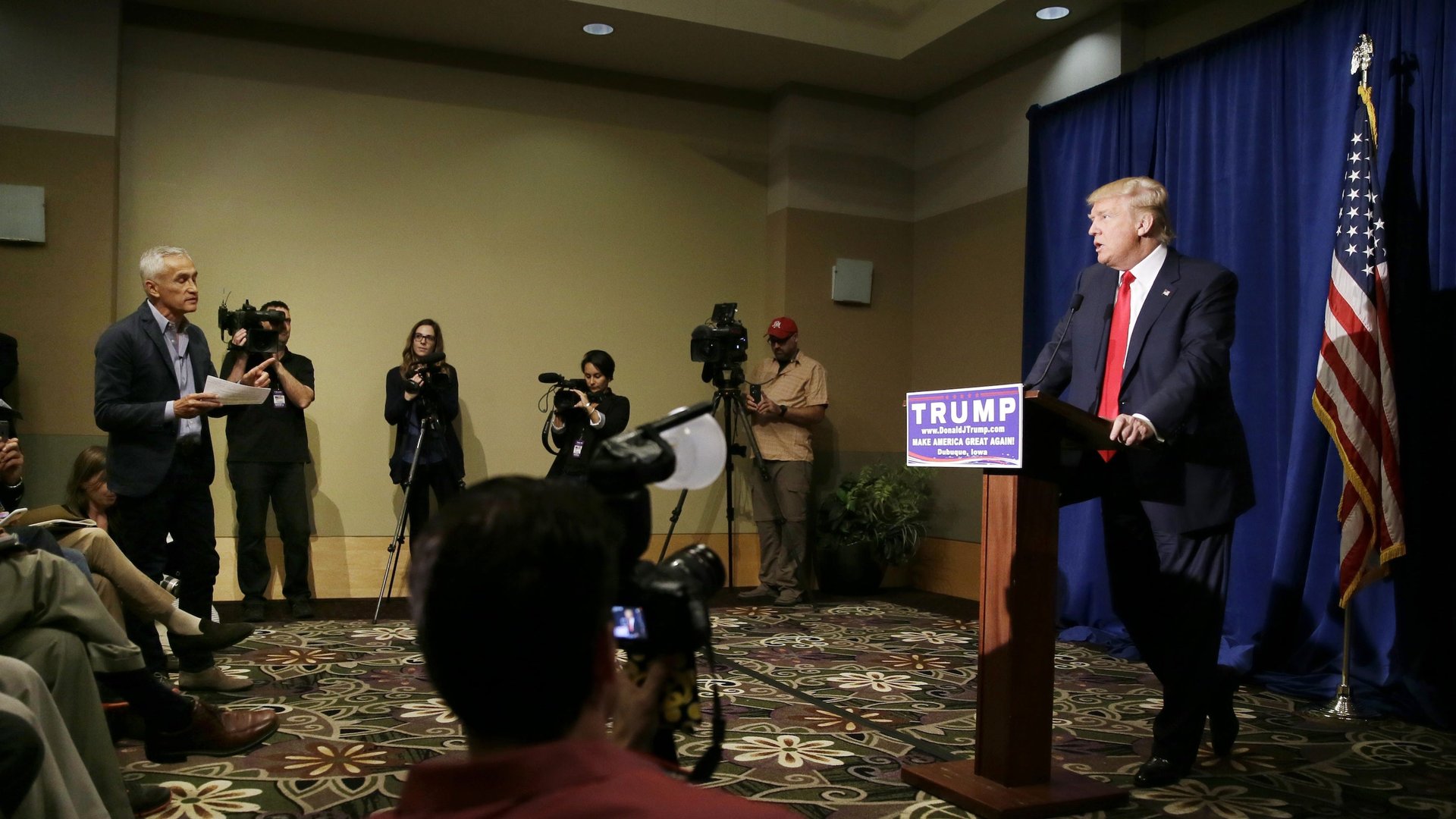When Dan Rather confronted politicians, it was journalism. When Jorge Ramos does, it’s “crossing the line”
In one of the more widely publicized moments of an already-ridiculous US presidential circus (I mean race), Republican hopeful Donald Trump had his security detail bounce Univision/Fusion anchor Jorge Ramos from a press conference in Iowa on Aug. 26.


In one of the more widely publicized moments of an already-ridiculous US presidential circus (I mean race), Republican hopeful Donald Trump had his security detail bounce Univision/Fusion anchor Jorge Ramos from a press conference in Iowa on Aug. 26.
Ramos, widely considered the most trusted voice in US Spanish-language news, stood “without being called on and began asking questions about Trump’s immigration proposals,” according to The Los Angeles Times, “which include ending birthright citizenship and deporting the estimated 11 million people who are in the US illegally, along with their families.”
“You weren’t called,” Trump responded during the televised verbal scuffle. “Sit down.” When Ramos persisted, Trump snarled, “Go back to Univision,” signaling security to move in.
It’s widely known that the GOP frontrunner has an axe to grind with Univision. He’s currently suing the network for a $500 million in damages after it dropped coverage of his Miss Universe pageant; a move prompted by Trump’s public comments on what he called a “mind-boggling” link between rape and illegal immigration.
This latest exchange was caught on video, however, and rapidly went viral. Though a representative for Trump eventually invited Ramos to return, it was not before he was approached by one of the reality TV-star’s supporters.
“Get out of my country,” the man said.
“I’m a US citizen,” Ramos retorted.
“Well, whatever,” he huffed. “Univision, no. It’s not about you.”
“It’s not about you,” Ramos replied. “It’s about the United States.”
In the aftermath, a number of journalists openly criticized Ramos’s tactics. Politico’s Marc Caputo called it bias—“taking the news personally, explicitly advocating an agenda.” The Washington Post’s Michael E. Miller called Ramos a “conflict junkie.” Morning Joe’s Joe Scarborough accused the veteran newsman of trying to snag his “15 minutes of fame”—a rather amusing statement, considering the fact that an average of 2 million viewers tune into watch Ramos host Noticiero Univision each night, while Morning Joe regularly comes in dead last, ratings-wise.
This kind of criticism smacks of privilege and respectability politics. Dan Rather has been lionized for repeatedly, aggressively confronting US politicians. What Ramos did was no different. And in refusing to play nicely with Donald Trump—a man who smugly refuses to play nicely with Hispanic Americans—Ramos is bringing to the forefront a segment of US society, that while often overlooked, refuses to be invisible in 2016.
In a way, Joe Scarborough’s comments are the most telling. Across the country, countless white viewers were undoubtedly asking themselves, “Who is this guy?” They should probably ask the more than 50 million native Spanish speakers residing in the United States—surpassing the entire population of Spain. The rules of media etiquette may have worked for Joe Scarborough and company, but they have systemically marginalized journalists of color, and the communities they serve, for decades.
No more.
If Republican candidates like Trump are going to attempt to shamelessly solicit the white nativist base by demonizing people of color, they need to know they will not be permitted to do so in a vacuum. They will be held accountable for their remarks. In 2016, Ramos is a major part of the equation. Kicking him out of the room is hardly removing him from the picture.